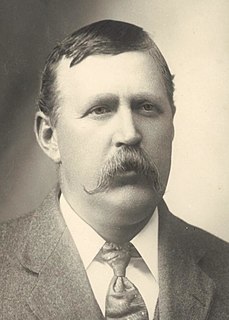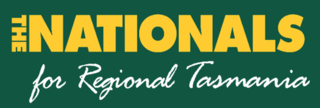
John Blyth Hayes was an Australian politician who served as a Senator for Tasmania from 1923 to 1947. He was President of the Senate from 1938 to 1941. Before entering federal politics, he had been a member of the Parliament of Tasmania from 1913 to 1923 and served as Premier of Tasmania for almost exactly one year, from 1922 to 1923.

The 1917 Australian federal election was held in Australia on 5 May 1917. All 75 seats in the House of Representatives and 18 of the 36 seats in the Senate were up for election. The incumbent Nationalist Party, led by Prime Minister Billy Hughes, defeated the opposition Labor Party led by Frank Tudor in a landslide.

The 1916 Tasmanian state election was held on Thursday, 23 March 1916 in the Australian state of Tasmania to elect 30 members of the Tasmanian House of Assembly. The election used the Hare-Clark proportional representation system — six members were elected from each of five electorates.

The 1919 Tasmanian state election was held on 31 May 1919 in the Australian state of Tasmania to elect 30 members of the Tasmanian House of Assembly. The election used the Hare-Clark proportional representation system — six members were elected from each of five electorates.
The 1925 Tasmanian state election was held on Wednesday, 3 June 1925 in the Australian state of Tasmania to elect 30 members of the Tasmanian House of Assembly. The election used the Hare-Clark proportional representation system — six members were elected from each of five electorates.

The 1928 Tasmanian state election was held on Wednesday, 30 May 1928 in the Australian state of Tasmania to elect 30 members of the Tasmanian House of Assembly. The election used the Hare-Clark proportional representation system — six members were elected from each of five electorates.

The 1950 Tasmanian state election was held on 6 May 1950 in the Australian state of Tasmania to elect 30 members of the Tasmanian House of Assembly. The election used the Hare-Clark proportional representation system — six members were elected from each of five electorates.
This is a list of members of the Western Australian Legislative Assembly between the 1914 election and the 1917 election, together known as the Ninth Parliament. The re-election of Premier John Scaddan's Labor Government with a 26-24 majority in 1914 was tempered when, a year later, Labor member Joseph Gardiner's seat was declared vacant on account of his non-attendance and a Liberal was elected in his stead, and Labor became a minority government when on 18 December 1915, Edward Johnston resigned from the Labor Party and became an independent. On 27 July 1916, the Scaddan Ministry was defeated and the Liberals' Frank Wilson became the new Premier.

Charles Richard Howroyd was an Australian politician. He was a member of the Tasmanian House of Assembly from 1909 until 1917, representing the Australian Labor Party until leaving the party in the 1916 Labor split. He was then elected to the Australian House of Representatives at the 1917 federal election, but died only five days later.
This article provides information on candidates who stood for the 1919 Australian federal election. The election was held on 13 December 1919.
This is a list of members of the Tasmanian House of Assembly between the 30 April 1909 election and the 30 April 1912 election.
This is a list of members of the Tasmanian House of Assembly between the 31 May 1919 election and the 10 June 1922 election. Nationalist MHA Walter Lee was the Premier of Tasmania throughout the term. In 1922, shortly before the election, a new Country Party emerged with several sitting Nationalist MPs joining it.
This is a list of members of the Tasmanian House of Assembly between the 10 June 1922 election and the 3 June 1925 election. The fledgling Country Party got five members elected, including two former Nationalists, but by the end of the term the party had all but merged into the Nationalist Party. A new Liberal Party emerged before the 1925 election, counting the support of three MHAs.
This is a list of members of the Tasmanian House of Assembly between the 30 May 1928 election and the 9 May 1931 election. The 1928 election failed to deliver a majority, and the Nationalists' John McPhee took over from Labor's Joseph Lyons as Premier of Tasmania. Lyons subsequently retired from state politics, obtaining election to the Federal seat of Wilmot and going on to become Prime Minister of Australia in 1931.
This is a list of members of the Tasmanian House of Assembly between the 9 May 1931 election and the 9 June 1934 election. The 1931 election produced a landslide victory for the Nationalists, in what turned out to be the non-Labor parties' last term in office until 1969.
This is a list of members of the Tasmanian House of Assembly between the 13 October 1956 election and the 2 May 1959 election. The previous Darwin division had been renamed Braddon after former Premier of Tasmania Sir Edward Braddon.
This is a list of members of the Tasmanian House of Assembly between the 2 May 1959 election and the 2 May 1964 election. Prior to this election, each of the five Tasmanian seats had been expanded from 6 to 7 members to provide an odd number of members, due mainly to a series of hung parliaments.

The Tasmanian Nationals are a political party in the Australian state of Tasmania, aligned with the National Party of Australia. The party is not currently registered with the Tasmanian Electoral Commission, and is not separately registered with the Australian Electoral Commission, unlike the other state branches of the Nationals.
The Australian Labor Party , commonly known as Tasmanian Labor, is the Tasmanian branch of the Australian Labor Party. It has been one of the most successful state Labor parties in Australia in terms of electoral success.
The Tasmanian Liberal League was a political party in the Australian state of Tasmania. It was founded in 1909 and merged into the Nationalist Party in 1917. During its existence it formed a two-party system in the Parliament of Tasmania with the Australian Labor Party (ALP). Although the league was created in the same year as the federal Liberal Party, there were no formal ties between the two.







